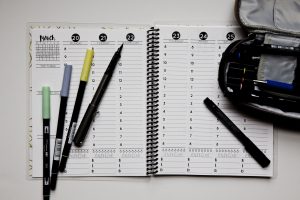As a first-year undergraduate student, I’ve had to learn to adjust to the independent nature of higher education whilst also making sure that I’m using my time as effectively as possible whilst learning virtually. This has meant a period of adjustment, where I’ve been trying out what works best for me and what allows me to work towards my academic goals whilst also ensuring that I am being healthy. An adjustment period is natural and there is absolutely no need to feel like you should be understanding everything at this stage. Everyone’s academic abilities and interests vary, and this time can also be used to learn about ways to get help and which services work for you.
Throughout this period, I have compiled a list of what has worked efficiently for me and what has made this term much easier for me.
1. Designating each day to a specific module
 As a BA Geography student, I have three geography modules and a fourth module outside of the department which is ‘Introduction to Economics’. By designating each day to a specific module, I can ensure that I can give each module an equal amount of focus. This was something that I wasn’t that great at during my A-Levels, but now this system has helped me create more of a balance. I try to watch the lecture, complete any designated tasks, and do the required readings for each module on that day. I dedicate the Friday for catching up on any work, with the weekend left for me to relax, prepare for next week’s classes and work on my career skills.
As a BA Geography student, I have three geography modules and a fourth module outside of the department which is ‘Introduction to Economics’. By designating each day to a specific module, I can ensure that I can give each module an equal amount of focus. This was something that I wasn’t that great at during my A-Levels, but now this system has helped me create more of a balance. I try to watch the lecture, complete any designated tasks, and do the required readings for each module on that day. I dedicate the Friday for catching up on any work, with the weekend left for me to relax, prepare for next week’s classes and work on my career skills.
2. Keeping separate to-do-lists
This is something that I have only started recently. As I work through the week, I keep a to-do-list of the tasks I am unable to complete, such as a reading card for a lecture. However, I make sure to keep an academic to-do-list and a non-academic to-do-list so it doesn’t get too confusing for me! This way I know which tasks need to be done as soon as possible or which tasks (such as booking an office hour) can be done even when I am not at my desk.
 3. Keeping a physical diary
3. Keeping a physical diary
This may be something that has become less common or something students may wish to ditch post-secondary school, but I have found it to be extremely valuable. I can see when I am unavailable, without the risk of my phone deleting all my reminders (which it constantly does) and I have made it a habit now to check it first thing in the morning. This allows me to have more of a routine, something that I lost during the first lockdown!
4. Having a list of goals that are not academically related
 It’s important to keep healthy, both mentally and physically, especially during these exceptionally difficult times. Sometimes it can be easy to lose yourself to stress. During the first lockdown I made a list of all the things I wanted to accomplish for myself that wasn’t school related. I would schedule a period of silent reflection everyday (which has been an absolute game changer for me) and a list of the books I wanted to read. These in themselves do not seem like goals, but more like things to do, which I like to categorise.
It’s important to keep healthy, both mentally and physically, especially during these exceptionally difficult times. Sometimes it can be easy to lose yourself to stress. During the first lockdown I made a list of all the things I wanted to accomplish for myself that wasn’t school related. I would schedule a period of silent reflection everyday (which has been an absolute game changer for me) and a list of the books I wanted to read. These in themselves do not seem like goals, but more like things to do, which I like to categorise.
For instance, reading for pleasure will not only allow me to develop my vocabulary but will also allow me to understand which genres I like and why, what I like about this book and could possibly relate to the field I am studying or create an opportunity to write an essay on a subject matter that I’m passionate about. This would come under the category of ‘developing my critical skills’.
5. Stay hydrated!
Finally, but perhaps the easiest to carry out – always have a water bottle near you when studying wherever you are! This keeps me fuelled and means that I am hydrated as well as keeping me away from caffeine!





